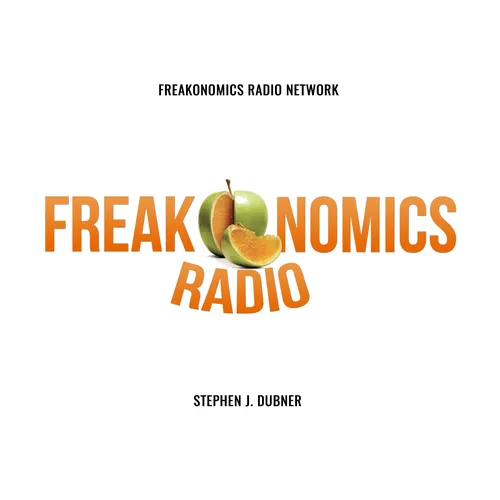
Freakonomics Radio
Freakonomics co-author Stephen J. Dubner uncovers the hidden side of everything. Why is it safer to fly in an airplane than drive a car? How do we decide whom to marry? Why is the media so full of bad news? Also: things you never knew you wanted to know about wolves, bananas, pollution, search engines, and the quirks of human behavior.
To get every show in the Freakonomics Radio Network without ads and a monthly bonus episode of Freakonomics Radio, start a free trial for SiriusXM Podcasts+ on Apple Podcasts or by visiting siriusxm.com/podcastsplus.
- Update frequency
- every 5 days
- Average duration
- 41 minutes
- Episodes
- 857
- Years Active
- 2010 - 2025

Trust Me (Rebroadcast)
Societies where people trust one another are healthier and wealthier. In the U.S. (and the U.K. and elsewhere), social trust has been falling for decades — in part because our populations are more di…

Make Me a Match (Rebroadcast)
Sure, markets generally work well. But for some transactions — like school admissions and organ transplants — money alone can't solve the problem. That's when you need a market-design wizard like Al …

312. Not Your Grandmother’s I.M.F.
The International Monetary Fund has long been the "lender of last resort" for economies in crisis. Christine Lagarde, who runs the institution, would like to prevent those crises from ever happening.…

311. Why Is the Live-Event Ticket Market So Screwed Up?
The public has almost no chance to buy good tickets to the best events. Ticket brokers, meanwhile, make huge profits on the secondary markets. Here's the story of how this market got so dysfunctional…

310. Are We Running Out of Ideas?
Economists have a hard time explaining why productivity growth has been shrinking. One theory: true innovation has gotten much harder – and much more expensive. So what should we do next?

Is America Ready for a “No-Lose Lottery”? (Update)
Most people don't enjoy the simple, boring act of putting money in a savings account. But we do love to play the lottery. So what if you combine the two, creating a new kind of savings account with a…

309. Nurses to the Rescue!
They are the most-trusted profession in America (and with good reason). They are critical to patient outcomes (especially in primary care). Could the growing army of nurse practitioners be an answer …

308. How Can I Do the Most Social Good With $100? And Other FREAK-quently Asked Questions
Dubner and his Freakonomics co-author Steve Levitt answer your questions about crime, traffic, real-estate agents, the Ph.D. glut, and how to not get eaten by a bear.

Why Is There So Much Ground Beef in the World? (Special Feature)
In this live episode of "Tell Me Something I Don't Know," you'll learn about carcass balancing, teen sleeping, and brand naming. Joining Stephen J. Dubner as co-host is Alex Wagner (CBS This Morning …

307. Thinking Is Expensive. Who’s Supposed to Pay for It?
Corporations and rich people donate billions to their favorite think tanks and foundations. Should we be grateful for their generosity — or suspicious of their motives?

306. How to Launch a Behavior-Change Revolution
Academic studies are nice, and so are Nobel Prizes. But to truly prove the value of a new idea, you have to unleash it to the masses. That's what a dream team of social scientists is doing — and we s…

305. The Demonization of Gluten
Celiac disease is thought to affect roughly one percent of the population. The good news: it can be treated by quitting gluten. The bad news: many celiac patients haven't been diagnosed. The weird ne…

304. What Are the Secrets of the German Economy — and Should We Steal Them?
Smart government policies, good industrial relations, and high-end products have helped German manufacturing beat back the threats of globalization.

“Tell Me Something I Don't Know” on the topic of Behavior Change (Special Feature)
Stephen J. Dubner hosts an episode full of the world's most renowned behavior change experts, including Colin Camerer, Ayelet Fishbach, David Laibson, Max Bazerman, Katy Milkman, and Kevin Volpp. Ang…

303. Why Larry Summers Is the Economist Everyone Hates to Love
He's been U.S. Treasury Secretary, a chief economist for the Obama White House and the World Bank, and president of Harvard. He's one of the most brilliant economists of his generation (and perhaps t…

302. Why Learn Esperanto?
A language invented in the 19th century, and meant to be universal, it never really caught on. So why does a group of Esperantists from around the world gather once a year to celebrate their bond?

301. What Would Be the Best Universal Language? (Earth 2.0 Series)
We explore votes for English, Indonesian, and … Esperanto! The search for a common language goes back millennia, but so much still gets lost in translation. Will technology finally solve that?

300. Why Don’t We All Speak the Same Language? (Earth 2.0 Series)
There are 7,000 languages spoken on Earth. What are the costs — and benefits — of our modern-day Tower of Babel?

299. "How Much Brain Damage Do I Have?"
John Urschel was the only player in the N.F.L. simultaneously getting a math Ph.D. at M.I.T. But after a new study came out linking football to brain damage, he abruptly retired. Here's the inside st…

Bad Medicine, Part 3: Death by Diagnosis (Rebroadcast)
By some estimates, medical error is the third-leading cause of death in the U.S. How can that be? And what's to be done? Our third and final episode in this series offers some encouraging answers.